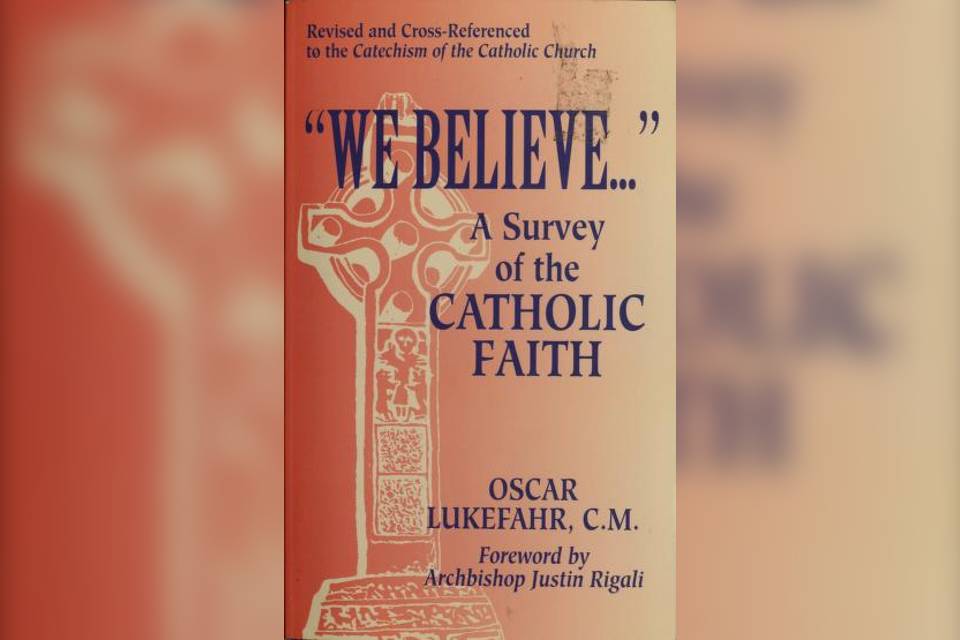
“We Believe…”
E. The Historical Books
These books cover the period from the entry of the Israelites into the Promised Land in about 1210 to the end of the Maccabean wars in about 142. They are not to be equated with modern history, for ancient historians did not have printing, videorecorders, and telephones. They did not achieve the accuracy we expect from modern historians and the often were not concerned about it. Their primary purpose was to teach the story of the encounter of God and humankind, and their works are called “salvation history” to distinguish them from modern history. Nevertheless, the Bible contains much accurate historical data, and many of the names, places, and events have been verified from other sources.
The book of Joshua continues the story of the Israelite people after the death of Moses. Led into the Promised Land by Joshua, the Israelite warred against the inhabitants and established footholds throughout Palestine. Judges describe the time after Joshua’s death. A two-hundred-yearlong “frontier” period of war and settlement under leaders called “judges.” Ruth is a beautiful story about love and loyalty in the life of one of King David’s ancestors who lived in that frontier period.
The First and Second Books of Samuel tell about the last judges, Eli and Samuel, and relate how the Israelites were united in 1020 under Saul, their first king. They then describe troubled relationship of Saul and David, and long reign of King David. First and Second Kings take up the story of David’s old age, describe how he was succeeded by Solomon, and explain the long decline of the Jewish people that began after David’s death. Significant events of this period were the split of Israel into north and south-the fall of the north to Assyria and that of the south to Babylonian. The First and Second Book of Chronicles are mostly a theologically oriented repetition of material in the Books of Kings.
The Book of Ezra and Nehemiah cover the return of the Israelites from exile to Babylon and the rebuilding of the Jerusalem temple and walls. Tobit, Judith, and Esther are the sort of literature we might call “historical novels.” They are stories set during the exile and restoration that teach trust, courage, care for others, and the importance of remaining faithful to God.
The First Book of Maccabees contains the account of Israel’s heroic resistance to the persecution by Antiochus IV, a Syrian king who attempted to abolish Jewish religious practices between 171 and 164, and of the struggles for independence waged by the Jews down to 142. The Second Book of Maccabees relates in more detail events already narrated in First Maccabees.
F. The Wisdom Books
These books are an inspired search into the meaning of life. Using poetry and proverbs, saying and songs, they face the problems of our origin and destiny, human suffering, good and evil, right and wrong. They deal with homely everyday situations and with the most critical issues of life and death.
The Book of Job is a great poem written around 500. It attacks the theory that all suffering is sent by God as punishment for sin and concludes that we cannot give easy answers to the riddle of suffering. Suffering does not separate us from God, and God’s presence can help us accept and overcome it.
The Book of Psalms is a collection of one hundred fifty prayers in the form of Hebrew poetry. Most were written in the years between King David and the restoration after the Babylonian exile. They address every human emotion and situation, and vary greatly in style, length, and approach. As Hebrew poetry, they depend on the balance of thoughts rather than on rhyme. A good way to use the psalms is to read through them, keeping a list of those that are meaningful for private prayer and reflection.
The Book of Proverbs is a collection of wise sayings. The oldest ones date to before the time of Solomon (970) and the newest to about 400. They cover every subject imaginable, from down-to-earth worldly wisdom lofty theological reflection. Ecclesiastes is a book that points out the limitations of human life and the difficulty of knowing its meaning. The author, unaware of the reality of eternal life, advised his readers to live a moral, balanced life, without expecting too much happiness. Written about 300, it demonstrates our need for the wisdom only Christ can give. The Song of Songs is a dramatic poem praising the beauty of human love. Created about 300, it is seen by many commentators as symbolic of the love God has for people. Wisdom may be the last book of the Old Testament to have been written. Composed around 75, it presents a philosophical reflection on the meaning of Hebrew history and expresses belief and eternal life. Sirach (called in some Bibles Ecclesiasticus), written around 180, is a book similar to Proverbs. It organizes sayings according to subject matter on topics from table etiquette to religious worship.


No Comments